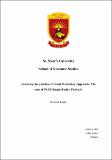| dc.description.abstract | Population Services International/Ethiopia (PSI/E), founded in 2003, engaged in social
marketing and communication of health programs throughout the country but there are
issues and questions raised by different stakeholders about the applicability and
effectiveness of the approaches. Some claim; it cannot effectively influence audiences
to behave and use products and services, others questions marketing approach
applicability in the health field and most argued about the non government
organization involvement in sales and marketing of health programs. The general
objective of this study is to assess Population Services International’s practice of
social marketing: identify the company practice of social marketing, determine the
applicability to health, identify potential challenges, and to identify how the company
measure its impact and interventions. This study was exploratory and descriptive in
nature in order to gain in-depth information about the problem under investigation.
This is an organizational-based, cross-sectional, formative assessment that exclusively
employed qualitative research methods. The study revealed that social marketing is an
easy way to tackle health problems and other social change activities since the
interventions are focused and targeted in all aspects. In addition, social marketing
ensures the sustainability of such interventions by engaging the private sector and
sharing the burden of diseases with interested stakeholders by utilizing income
generating activities. However, PSI/E is weak in the public relations and
communication of its social marketing interventions to government officials and other
stakeholders, and that weakness creates confusion among external customers. The
organization also lacks marketing and sales professionals and is outweighed by the
health professionals with less marketing knowledge and experience. PSI has a huge
opportunity to diversify its interventions by using more marketing approaches.
Therefore, in order apply the social marketing approach in a more successful way,
PSI/E should do structured public relations, advocacy and sensitization workshops and
involve more marketing professionals to get buy-in and support from the local
government and other stakeholders as well for better marketing strategy design. | en |


